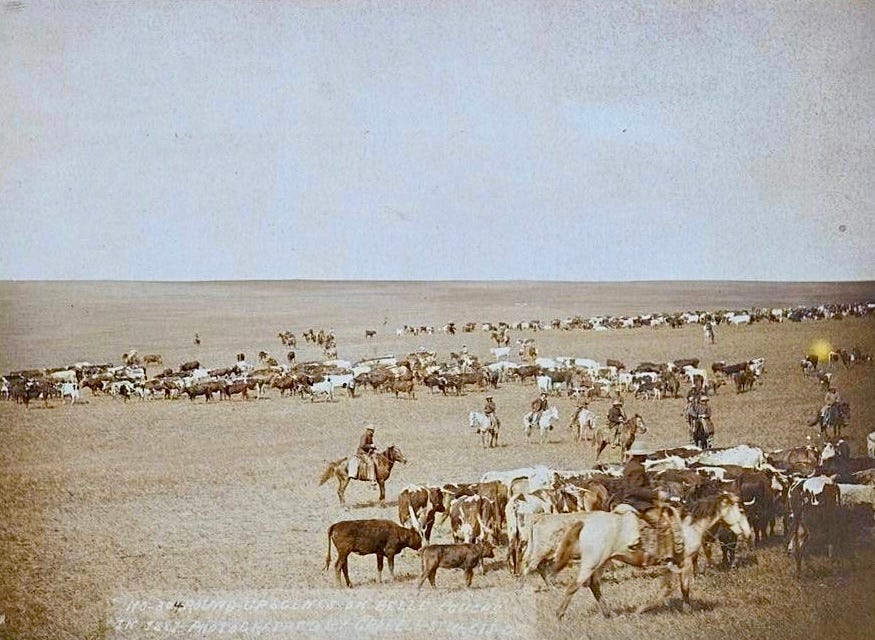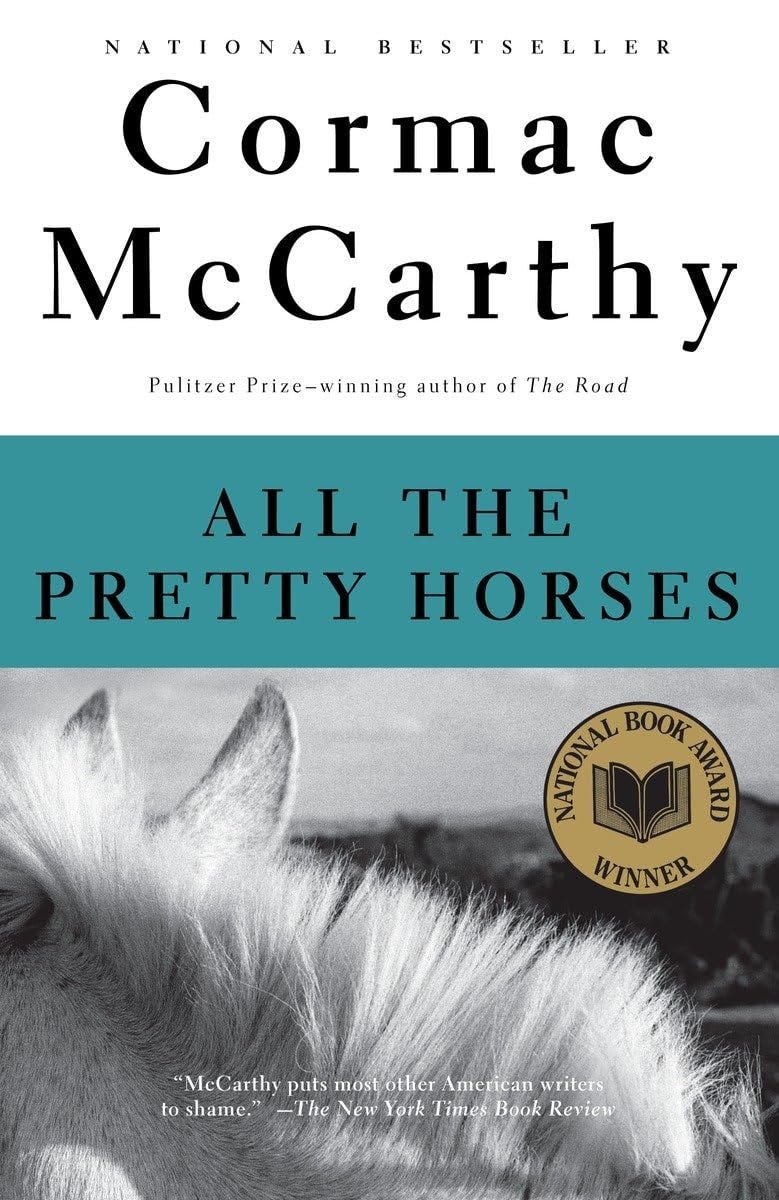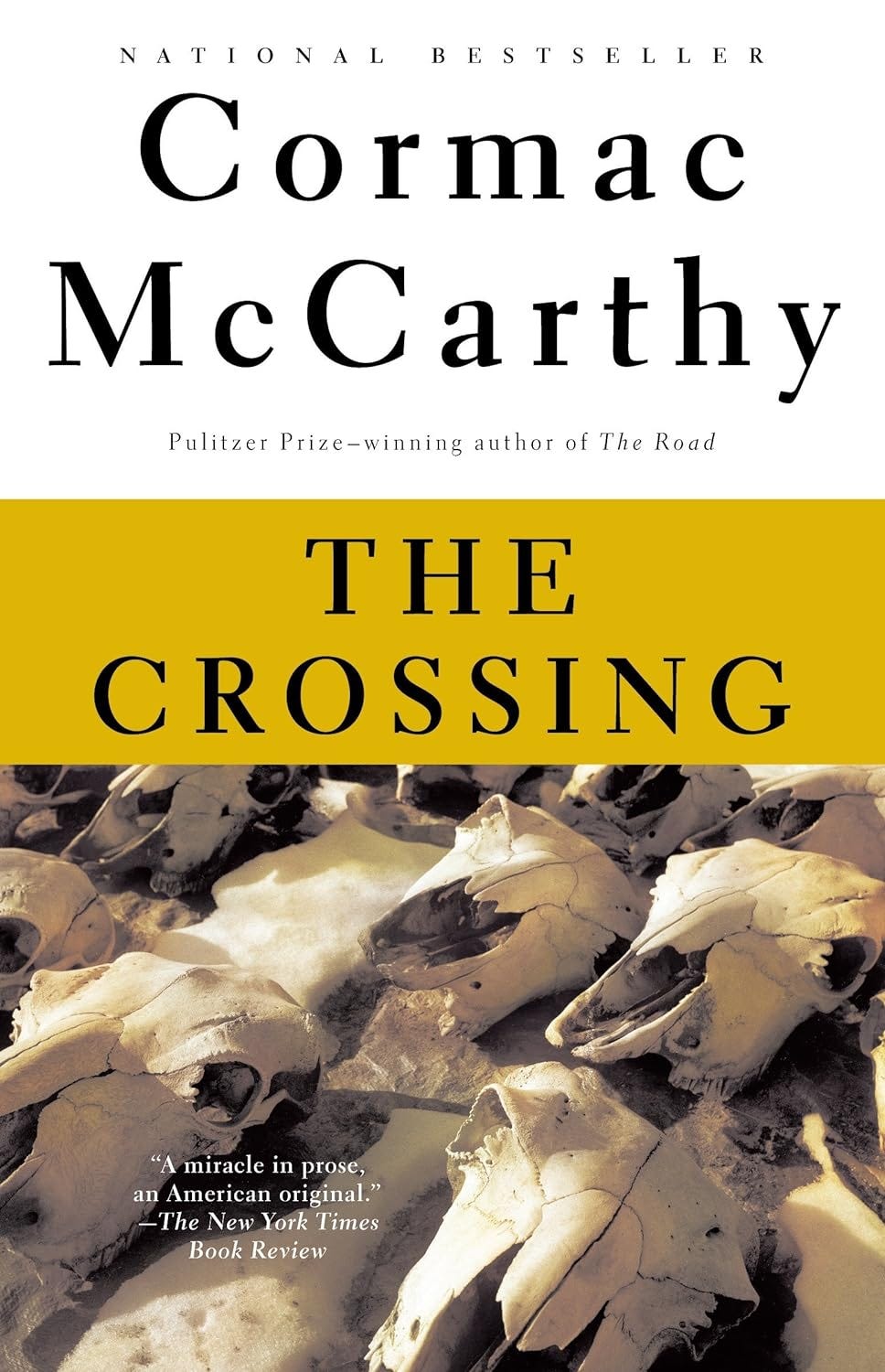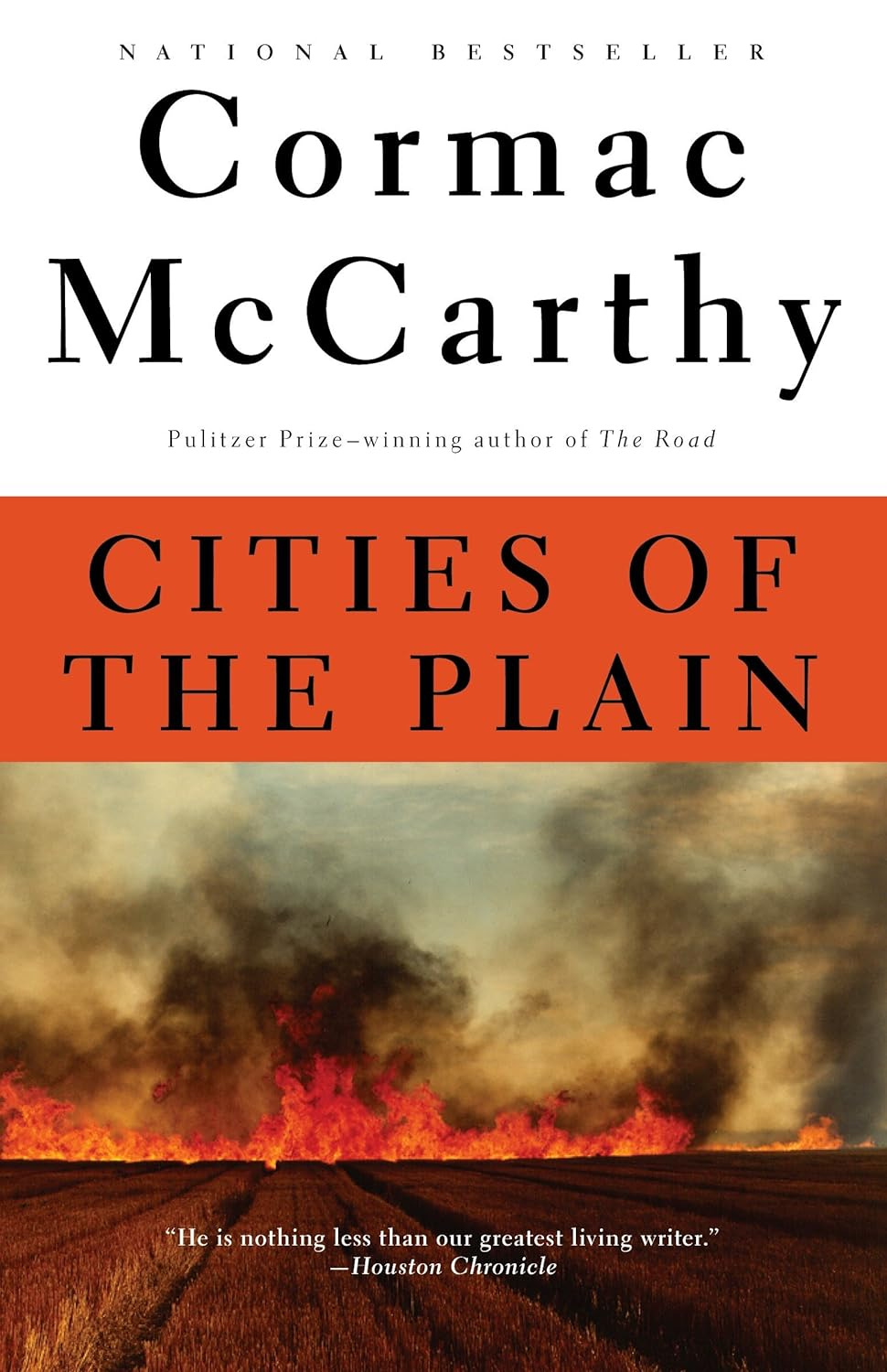Cormac McCarthy’s Border Trilogy
Reviewing ‘All the Pretty Horses,’ ‘The Crossing,’ and ‘Cities of the Plain’
A man holds a gun to my head. “Summarize Cormac McCarthy’s Border Trilogy in a single sentence,” he says.
I jolt. “You want me to,” I say, voice cracking, “distill more than a thousand pages, stretching across three novels into a solitary sentence?”
He answers, nonverbally. I hear the clack of his cocked hammer next to my ear, fully aware no edition of the Chicago Manual of Style permits the punctuation he next intends.

“John Grady Cole,” I start with a catch and warble in my voice, “has”—it suddenly comes to me—“the worst luck with Mexican women, and”—I sustain the connective syllable as I mentally hunt for the handgrip on the next passing train of thought—“Billy Parham can’t win south of the border.”
I await the loudest exclamation point I’ll ever hear. Instead, I register the clean, clear mechanical click of the hammer vacating its ready position of impending violence. The man holsters his pistol, turns, and walks.
Wait, that worked? Sure, my single sentence described the doings of the three books, but . . .
“Are you kidding me?” I yell, spinning to face the disappointing gunman’s retreating shape. “There’s more! Don’t you want to know the rest?”
At the start of All the Pretty Horses, John Grady Cole is just sixteen but, faced with grim prospects at home, decides to hire on as a ranch hand in Mexico with his friend Lacey Rawlins. It’s several years after World War II, and the Old West is vanishing fast. Still, he saddles up his horse, Redbo. With Lacey astride Junior, they point South and ride.
Modern-day developmental psychologists would say John Grady’s executive function hasn’t yet fully come on line. It shows. He’s likable but every bit as overconfident in his abilities as he is ignorant of the world’s unwritten rules.
Then again, John Grady looks like a veritable genius compared to Jimmy Blevins, who meets the southbound pair on the way, somehow even less prepared for the adventures ahead and riding what might be a stolen horse. Shenanigans ensue and Blevins both loses and reacquires his horse, in the process implicating John Grady and Lacey as accomplices in a murder.
But the law—or whatever passes for it in Mexico—moves slowly. Having abandoned Blevins before the alleged crime, John Grady and Lacey find work at a large ranch breaking horses. John Grady not only wins the approval of the ranch owner, he also wins the affections of his daughter, Alejandra, and the distrustful attentions of the girl’s great aunt.

John Grady knows horses better than people. When the law finally calls, he finds no favor or protection from his boss because of his indiscretions with Alejandra. Instead, he and Lacey land in jail—with Blevins—under the vindictive control of a corrupt captain. Now bereft of nearly all hope, the foolish Blevins pays the highest price of all, while a surprise benefactor secures John Grady and Lacey’s release before they join him.
As Lacey makes it back the United States, John Grady returns in a final bid for Alejandra’s hand. She refuses him, but he returns home with a measure of self-dealt justice vis-à-vis the captain, along with the horses: Redbo, Junior, and Blevin’s snakebit steed.
Lest you think John Grady’s luck is lousy, Billy’s is worse. At bottom All the Pretty Horses is a romance. The Crossing is unremitting tragedy.
Billy’s story unfolds almost a decade before John Grady’s. He’s also sixteen when a wolf, traveling up from Mexico onto their New Mexico lands, begins killing his family’s cattle. Father and son try unsuccessfully to trap the creature, until one day—out on his own—Billy finds the wolf snagged in his trap.
By means both brilliant and slightly batty, he muzzles and leashes the wolf before freeing it from the trap. Realizing the animal will be killed the minute he returns with her, Billy decides instead to take her back to Mexico and starts the journey straightaway, telling not a soul of his mission and departure.
Along the way, he meets people both gentle and violent, ultimately failing to save the animal in his care. When he finally finds his way back north he discovers violence has visited his home and robbed him of his parents. Beset by marauders, the family has lost several of their finest horses, taken back across the border and sold. Billy decides to retrieve them. His younger brother Boyd joins him in the quest.
They eventually locate and liberate their horses but lose them again—and lose more besides. The pair save the life, or at least the virtue, of a young woman who develops an affection for Boyd. The brothers share a strained relationship, so it’s no surprise as Boyd recovers from a bullet wound he abandons Billy for the girl. It’s also no surprise the bullheaded Boyd gets himself killed.
When Billy discovers his fate, he tries to retrieve Boyd’s bones and meets with misfortune yet again. The tale ends in tears.
A few years pass for John Grady Cole and about a dozen for Billy Parham by the time we meet them again working as friends on a New Mexico ranch up the road from El Paso, Texas.
If All the Pretty Horses is romance and The Crossing tragedy, you’d be forgiven if at moments you deemed Cities of the Plain a comedy. McCarthy is known for unrelentingly savage and grim stories, but there are passages in Cities that are laugh-out-loud funny—for instance, a trip down several hundred miles of highway in which no jackrabbits are spared, or a horse auction that doubles as a comic study in mimetic rivalry. The story even veers towards a happy marriage for John Grady but then jolts and swerves.
The levity of the novel comes through the banter of the ranch hands. John Grady and Billy work on a larger team. The cowboys jab and josh each other, and the reader is invited to eavesdrop on their exchanges—none more exciting than when the men must rope a pack of wild dogs harrying and killing their cattle. It’s one of the most vividly realized action sequences I’ve ever read.

Of course, weightier matters impinge. John Grady falls in love with Magdalena, a prostitute across the border in Juarez, and tries to free her from her pimp and marry her. Billy shows up too late to help and, as with Alejandra, John Grady fails—though this time fatefully—in the effort.
McCarthy’s triple narrative does a lot, so much so that distilling it down to several paragraphs, as I’ve done above, is nearly as pointless and unsatisfying as reducing it to a single sentence. Yes, John Grady is unlucky in love and Billy has never gone to Mexico and come back with what he wanted to find. But McCarthy layers entire worlds, whole philosophies and theodicies, in the details.
There’s no way to adequately gather all the threads. But singling out just one, go back to that modifier fatefully. Much of what McCarthy writes turns on questions of fate and human agency.
“Ever dumb thing I ever done in my life there was a decision I made before that got me into it. It was never the dumb thing,” John Grady tells Lacey in All the Pretty Horses before they get permanently mixed up with Blevins. “It was always some choice I’d made before it.”
“Meanin what?” says Lacey.
“Meanin this is it. This is our last chance. Right now. This is the time and there wont be another time and I guarantee it.” Despite the warning, off they go and trigger all that’s to come.
Then, just a few pages later, Lacey asks John Grady if he believes God looks out for people.
“Yeah. I guess He does,” answers John Grady. “You?”
“Yeah. I do,” says Lacey, explaining himself: “Way the world is. Somebody can wake up and sneeze somewhere in Arkansas or some damn place and before you’re done there’s wars and ruination and all hell. You don know what’s goin to happen. I’d say He’s just about got to. I dont believe we’d make it a day otherwise.”
In the worldview of the stories, all the subsequent action in the next nine hundred pages takes place within the fundamental tension of human agency and God’s providence. Characters lean toward one pole or the other. “In history there are no control groups,” says Alejandra’s aunt. “What is constant in history is greed and foolishness and a love of blood and this is a thing that even God—who knows all that can be known—seems powerless to change.”
John Grady vacillates between the two. Following his manifold misfortunes, the corrupt captain asks him if he’s afraid of God. “I got no reason to be afraid of God,” he answers. “I’ve even got a bone or two to pick with Him.”
The question of fate is baked into The Crossing as part of the narrative structure. Early in each of the four lengthy chapters that comprise the book, a sage speaks something to Billy that foretells the action to follow. One instance: An opera singer, part of a troupe the boys meet along the road, tells Billy:
Long voyages often lose themselves. . . . You will see. It is difficult even for brothers to travel together on such a voyage. The road has its own reasons and no two travelers will have the same understanding of those reasons. If indeed they come to an understanding of them at all.
Billy has already lost his family and will lose Boyd, twice—all because Boyd, the road itself, has different ideas than he does. In a sense, Billy will lose Boyd a third time in the person of John Grady.
A palm reader—the fourth of the sages—alludes to their future friendship, his second brother. The palm reader also tells Billy he’ll live a long life, which is improbable but true, and that “while the rain fell by the will of God evil chose its own hour and that those whom it sought out were perhaps not entirely lacking of some certain darkness in themselves.” That same tension between the providence of God and the wayward will of his creatures.
Is there a way through the tension?
In Cities of the Plain John Grady confides in a blind pianist, the maestro, at a bar called the Moderno about Magdalena and seeks his wisdom. “Our plans are predicated upon a future unknown to us,” says the maestro. “The world takes its form hourly by a weighing of things at hand, and while we may seek to puzzle out that form we have no way to do so. We have only God’s law, and the wisdom to follow it if we will.”
John Grady later confesses to Magdalena that he believes in God “even if he was doubtful of men’s claims to know God’s mind.” But didn’t the maestro say we have God’s law? Perhaps people know that much. Perhaps that’s sufficient.
Billy seems to think so, even if only intuitively. After a truck of Mexicans take the injured Boyd and help him escape to safety, Billy is forever indebted and even years later takes pains to stop and help some Mexicans on the road with a flat tire.
“Are you done being a Samaritan?” his friend asks when he’s finished and later presses him for the reason he stopped to help: “Some sort of religious thing?”
“No,” says Billy. “It aint nothin like that. It’s just that the worst day of my life was one time when I was seventeen years old and me and my bud—my brother—we was on the run and he was hurt and there was a truckload of Mexicans just about like them back yonder appeared out of nowhere and pulled our bacon out of the fire. . . . They didnt have no reason to stop for us. But they did. I dont guess it would of even occurred to em not to. That’s all.”
And the wisdom to follow it if we will.
Decades later it comes back to Billy. Having failed to save Boyd again by letting John Grady die, he’s wrecked and wanders off the ranch, eventually becoming a homeless drifter. The palm reader told him he’d live long, and at the turn of the millennium he wanders as an old man into the care of a family who takes him in.
One night after dreaming of Boyd, he calls out in the night and the woman of the house comforts him. “I’m not what you think I am,” he says. “I aint nothin. I dont know why you put up with me.”
“Well, Mr Parham,” she says, “I know who you are. And I do know why.”
Again, the wisdom to follow it. . . .
But, also again, there’s more. There’s too much to fit. McCarthy knew the challenge. At the end of All the Pretty Horses, John Grady summarizes his story in court. It takes an hour. But even then he leaves out details. Not even the books themselves can contain the stories they present; McCarthy scholarship, reviews, articles, and discussion forums have spooled out in every direction since their publication.
In Charles Williams’s novel, Descent into Hell, a playwright is asked to summarize his work and says the only way to do so is to read the entire thing. I usually avoid making recommendations, but if you put a gun to my head that’s what I’d advise with the Border Trilogy, even if that meant taking my chances with a full stop.
Thanks for reading! If you enjoyed this post, please hit the ❤️ below and share it with your friends.
Not a subscriber? Take a moment and sign up. It’s free for now, and I’ll send you my top-fifteen quotes about books and reading. Thanks again!
Related post:






Joel, you had me laughing out loud to your opening (actually read it to my youngest over breakfast too:)! I had started "All the Pretty Horses" a while ago but got side-tracked. Will be sure to take it off my shelf and ad it to the "active pile" after reading your piece here :)
I've only read two McCarthy books; The Road and No Country for Old Men. I enjoyed both. I've shyed away from these because I've never been much for the Western-like aesthetic. But, I think i'm just about convinced to give them ago.